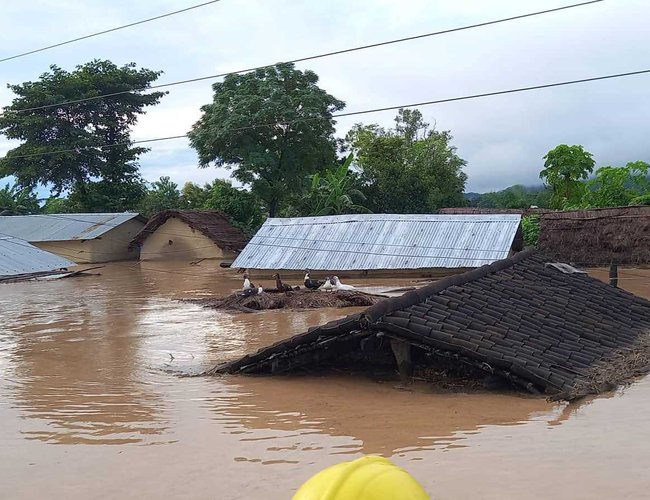
Human induced climate change is the definitive test of our time. Its far-reaching consequences are already gripping the world, with a bleak forecast that only gets worse if we don’t take immediate action now. Climate change is an urgent existential threat that affects countries worldwide. In recent weeks, extreme weather events have affected countries around the world, regardless of their income level.
Climate scientists are shocked by the scale and intensity of the floods, which have caused widespread damage and displacement. The consequences of this crisis are catastrophic, resulting in the loss of human lives, widespread destruction of infrastructure, and the staggering loss of hundreds of billions of dollarsworth of property. Extreme weather events, which are being intensified by climate change, have unleashed a relentless assault on countries and communities, highlighting the urgent need for global collaboration and multilateral action.
In Japan, climate change has brought about a surge in extreme weather events. These events have led to severe flooding, landslides, and significant damage to buildings and critical infrastructure. Heatwaves, amplified by climate change, pose risks to public health, particularly for vulnerable populations. The impacts of climate change in Japan highlight the need for global cooperation in protecting the lives and livelihoods of its citizens.
India is experiencing the effects of human-induced climate change on a massive scale, with heatwaves claiming numerous lives, particularly in densely populated urban areas with inadequate infrastructure to cope with extreme temperatures.Unpredictable monsoon patterns lead to floods and droughts, causing damage to infrastructure, agriculture, and displacing vulnerable populations as we are currently witnessing in North India. The North India floods and heatwave have been particularly devastating.
Here in Nepal, we face our own unique challenges due to human induced climate change. The changing climate in Nepal has already begun to affect various aspects of the country, including water resources, ecosystems, agriculture, and urban areas. The melting of glaciers and changing precipitation patterns are causing landslides, flash floods, and erratic monsoons. These events have caused displacement, damage, and disruption of vital services. The risk of glacial lake outburst floods (GLOFs) looms large in Nepal. In addition to these environmental and socio-economic consequences, climate change also has implications for national security. Addressing these impacts and protecting vulnerable populations require collective action and multilateral collaboration.
The impacts of climate change disproportionately affect vulnerable populations, particularly women, in low-income economies. These populations face additional challenges due to existing social and economic inequalities, limiting their abilities to adapt to and cope with climate change. Recognizing and addressing the specific vulnerabilities of women is essential for building resilience and achieving sustainable development.
Multilateralism is an indispensable force in combating climate change. The gravity of this crisis demands a unified international response. Together, we can forge robust policies to slash emissions and prepare ourselves against the climate's onslaught. The Paris Agreement is the most significant multilateral agreement on climate change which builds on the foundation of the Kyoto Protocol which was the first international treaty to set legally binding emissions reduction targets for developed countries. The Paris Agreement is embraced by 195 nations in 2015, it sets an ambitious target of limiting global warming to well below 2 degrees Celsius, ideally 1.5 degrees Celsius, above pre-industrial levels. Moreover, it mandates countries to submit their Nationally Determined Contributions, known as NDCs, outlining their emission reduction commitments.
While the Paris Agreement represents a momentous achievement, it alone falls short. We must push boundaries and expedite emission cuts, as well as address the crucial issue of climate finance to empower developing nations in adapting to climate change impacts.
Multilateralism, though plagued with challenges, triumphs in its benefits. It fosters the exchange of information and best practices, paving the way for more effective climate policies. It provides a platform for negotiation and consensus-building, ensuring a shared vision among nations. It cultivates trust and cooperation, indispensable in surmounting the daunting hurdles that climate change presents—a feat demanding global collaboration.
Of course, multilateralism is not without obstacles. Divergent interests and priorities among countries pose a hurdle, as not all nations bear equal burdens or share identical motivations in tackling climate change. The absence of robust enforcement mechanisms allows countries to renege on their commitments at will. The specter of free-riding looms, as some nations may exploit the efforts of others without contributing their fair share, impeding global emissions reductions.
Nonetheless, multilateralism stands as the primary approach to addressing climate change. Through collective endeavor, we transcend these challenges, forging a sustainable future for all.
Enter the Upcoming COP28
COP 28 or the 28th Conference of the Parties to the United Nations Framework Convention on Climate Change, is a major international climate summit that will be held in Dubai, United Arab Emirates, from November 30 to December 12, 2023. The summit will provide an opportunity for countries to come together and review progress on the Paris Agreement, as well as to negotiate new commitments to reduce greenhouse gas emissions.
The upcoming COP28 is particularly important because it will be the first major climate summit since the release of the IPCC's Sixth Assessment Report, which warned that the window of opportunity to limit global warming to 1.5 degrees Celsius is rapidly closing. The summit will also be a chance for countries to discuss the issue of climate finance, which is essential for helping developing countries adapt to the impacts of climate change. The upcoming COP28 is a major multilateral forum that can be used to build consensus on climate action and to mobilize global ambition. The summit can also be used to address the challenges of multilateralism, such as free-riding and the absence of robust enforcement mechanisms.
Furthermore, climate change poses significant implications for national security, and these concerns are expected to take center stage at the upcoming COP 28. As global temperatures continue to rise, we are witnessing extreme weather events, resource scarcity and increased migration patterns, all of which have direct implications on national security. Rising sea levels threaten coastal regions, displacing populations and leading to conflict over limited resources. Drought, desertification and water scarcity can deepen socioeconomic inequalities and can fuel tensions within and between nations.
Additionally, climate change acts as a threat multiplier, amplifying other security risks as terrorism, political instability and conflicts. At COP 28, it is imperative for nations to collaborate, share knowledge, and formulate strategies that prioritize climate action as a fundamental component of national security. By addressing the root causes of climate change and adopting adaptation and mitigation measures to build a resilient society and safeguard collective security.
In conclusion, the upcoming COP28 is a critical opportunity for countries to come together and take decisive action on climate change. The summit can be used to build momentum for climate action, to address the challenges of multilateralism, and to mobilize global ambition. The summit has the potential to significantly enhance the effectiveness of multilateralism in addressing climate change. Firstly, it can be used to build consensus on a new set of ambitious targets for emission reductions. Secondly, it can be used to negotiate new commitments on climate finance. Thirdly, it can be used to address the issue of free-riding and to strengthen enforcement mechanisms. Finally, it can be used to build trust and cooperation among countries. By taking these steps, the upcoming COP28 can help to ensure that multilateralism remains the paramount approach to addressing climate change.
Rajouria is a former Member Secretary of NTNC. He also worked for UNDP, UN-Habitat, UNEP and USAID. He completed MPA from Kennedy School of Government, Harvard University, and Climate Change &Public Policy Issues. Chairman, Climate & Co-Existence, and is also on the Board of like minded organizations.

Arup Rajouria
is an internationally recognized expert in climate change and natural resources management, with an impressive career at renowned organizations such as the former CEO of NTNC's CEO, UNDP, UN-Habitat, UNEP, and USAID. He obtained an MPA degree from Harvard
- Himalayan Meltdown: Threat Beyond Borders
- May 10, 2024
- Navigating The River of Doubts: The Evolving Dynamics Of India-Nepal Water Relations
- Jan 08, 2024
- A Cry From The Himalayas: Echoes Of Hope And Compromise At COP-28
- Dec 21, 2023
- Climate Crisis: Can world Leaders Rise to the Challenge ?
- Nov 17, 2023
- Conflict Diverts Attention: How the Hamas Israel Crisis Affects Climate Priorities At COP 28
- Oct 28, 2023
















